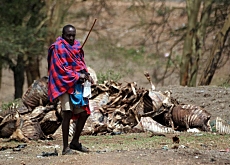
No big breakthroughs expected at climate talks

Bruno Oberle, head of the Swiss delegation at the post-Kyoto climate conference in Kenya, tells swissinfo that talks in Nairobi have failed to yield major results.
Delegates at the United Nations meeting are preparing to pack their bags after two weeks of intense discussions that end on Friday.
The Nairobi meeting has pursued two processes launched in Montreal in December 2005 – the start of negotiations on the successor to the Kyoto Protocol after 2012, and the so-called dialogue aimed at bringing major nations on board.
Oberle, head of the Federal Environment Office, says the conference has also been looking at measures to help countries adapt to climate change.
swissinfo: What is your overall impression of the progress made so far during these two weeks of talks?
Bruno Oberle: We have managed to sort out adaptation questions and we have a first impression of the direction in which the post-Kyoto period is likely to go. The “dialogue” process is underway and a great deal of technical work is also being done.
We should also congratulate the Kenyans for skilfully putting the spotlight on the much clearer link between emission cuts that need to be made and the consequences of climate change. This has been fundamental in increasing awareness of the need to accelerate discussions.
swissinfo: What is the status of the negotiations on the post-Kyoto regime?
B.O.: It’s commonly agreed that we have a quantity of emissions that pose a problem. So far we have only achieved a small part of our obligations to reduce harmful emissions and this percentage is actually going to become less and less important.
The industrialised nations clearly say they want to continue but want to see action from other countries.
swissinfo: The United States has made clear that it is not likely to apply the Kyoto Protocol. What about other countries, such as China, India or Brazil, which are not obliged to reduce emissions under Kyoto?
B.O.: Developing countries are actually doing many things to reduce emissions even though they are not part of the voluntary regime. The question is how to find a way of making their actions more visible and predictable for the industrialised nations.
China, for example, is undertaking and planning major measures to increase its efficient use of natural resources and energy. And things are moving in the right direction in the US too. Northwestern states are setting up a system of voluntary emission cuts and there’s a carbon market. And the Bush administration has realised that it is too dependent on fossil fuels.
The issue is how we can put all these actions together in a sufficiently coordinated manner to make them predictable. This will be a key point for the developing carbon markets and for overseeing the present and future global climate regime.
swissinfo: Adaptation and the adaptation fund have also been major points of discussion this week. Has disagreement over who manages the adaptation fund overshadowed the talks?
B.O.: We haven’t agreed on this point, but it shouldn’t pose a problem. All the necessary technical measures have been taken to ensure this fund works properly. Whether it is managed by the Global Environment Facility (GEF), an African Bank or another institution is a pseudo-political issue.
swissinfo: How can the adaptation fund generate more financial resources that are so badly needed by developing countries to adapt to climate change?
B.O.: At present around $200 million (SFr250 miilion) is available annually for adaptation but this is insufficient. There are several possibilities, one of which is the global carbon dioxide (CO2) tax proposed by the Swiss president that would encourage major producers to cut their emissions and provide sufficient funding for measures.
swissinfo, Simon Bradley in Nairobi
Swiss President Moritz Leuenberger is visiting Kenya and Ethiopia from November 13 to 17.
The Swiss president represented Switzerland during the 12th UN Climate Conference in Nairobi, which runs until November 17, and gave a special message during the opening of the ministers’ session on November 15.
Around 6,000 delegates and observers from 190 countries are attending the two-week summit.
Switzerland was the 110th country to ratify the Kyoto Protocol in 2003.
The Kyoto Protocol, an amendment to the UN Convention on Climate Change, was approved in 1997 and came into force in 2005. It has been ratified by industrialised countries – apart from the United States and Australia – and by a large number of developing countries.
It calls for industrialised nations to reduce harmful emissions by an average of 5.2% below 1990 levels by 2012.
The Swiss CO2 law formally took effect in 2000 and foresees additional measures if the targets can’t be met with voluntary means.
On November 8 the government declared that Switzerland had met its formal requirements under the Kyoto Protocol so that it would reduce its greenhouse gases by 8% below the 1990 level – or a maximum of 242.85 million tons of CO2 – between 2008 and 2012.

In compliance with the JTI standards
More: SWI swissinfo.ch certified by the Journalism Trust Initiative































You can find an overview of ongoing debates with our journalists here . Please join us!
If you want to start a conversation about a topic raised in this article or want to report factual errors, email us at english@swissinfo.ch.